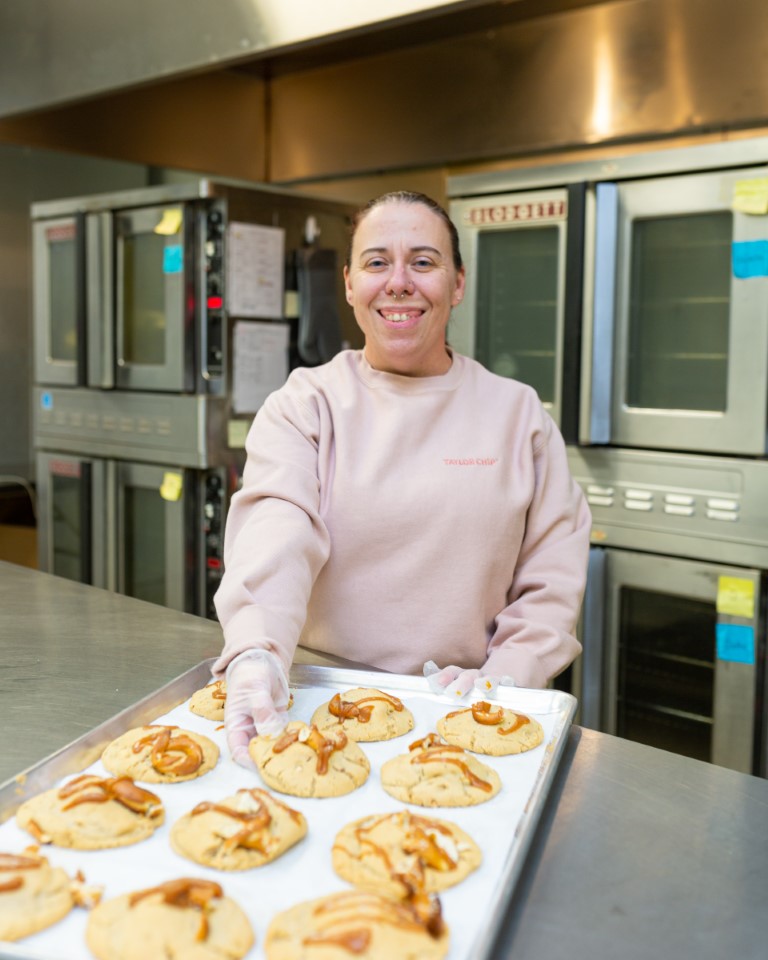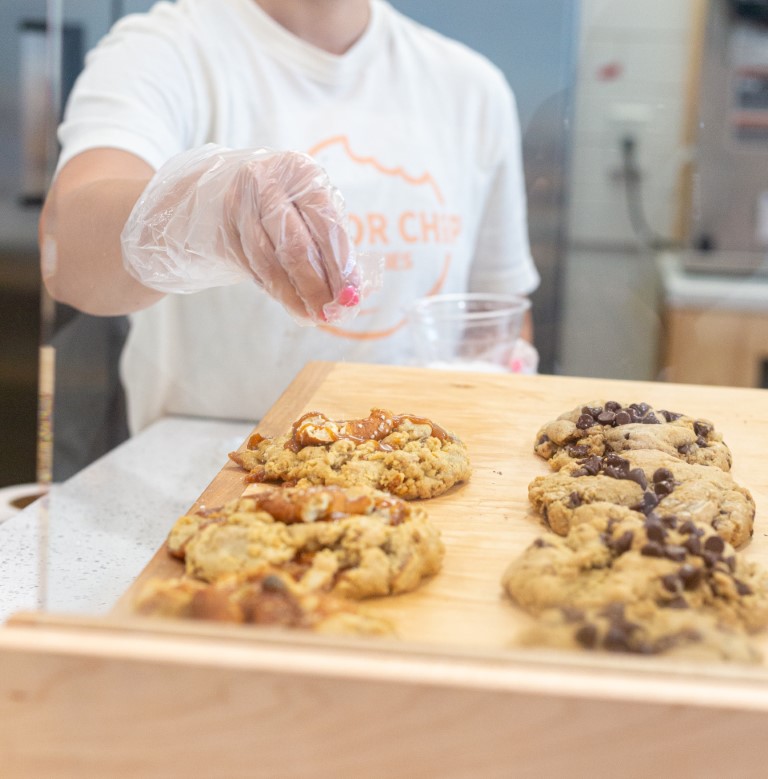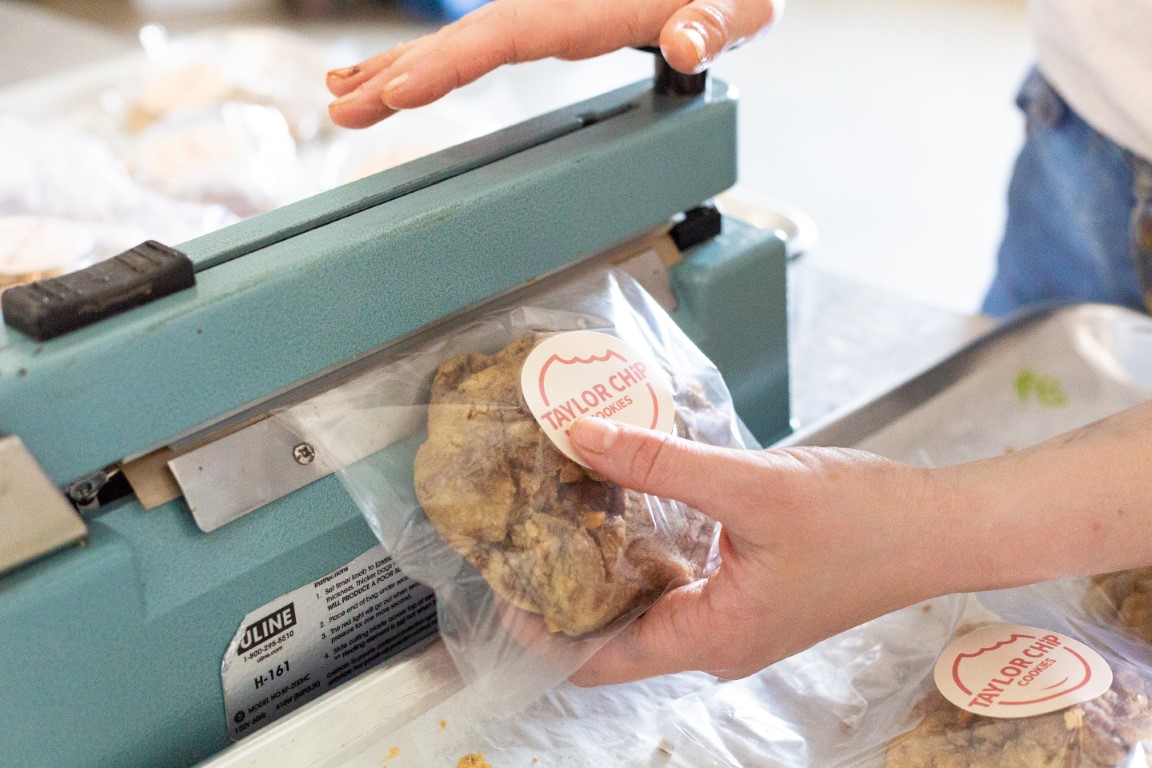Aluminum cookie sheets are safe for baking when you follow appropriate use guidelines. They offer exceptional heat conductivity and durability, making them a favorite among bakers. However, consider potential leaching, particularly with acidic foods on non-anodized surfaces. Using parchment paper or a silicone mat can reduce direct contact and increase safety. Anodized aluminum sheets are a safer alternative, as their protective coating minimizes leaching risks. Regular care, including inspecting for scratches and warping, guarantees their safe and prolonged use. Exploring other materials like stainless steel or silicone might also enhance your baking experience and provide peace of mind.
Key Takeaways
- Aluminum cookie sheets are considered safe for baking, with minimal leaching under normal conditions.
- Using parchment paper or silicone mats reduces aluminum exposure during baking.
- Anodized aluminum offers a safer, non-reactive cooking surface compared to regular aluminum.
- Avoid using aluminum sheets with deep scratches or damage to prevent increased leaching.
- Health organizations generally deem aluminum bakeware safe if harmful coatings are absent.
What Are Aluminum Cookie Sheets
Aluminum cookie sheets, popular in many kitchens, come in various types including non-coated and anodized versions, each designed for specific baking needs. Known for their excellent heat conductivity, these sheets guarantee even baking and browning, which is essential for achieving perfect cookies. You'll find they're not only affordable but also lightweight and durable, making them a preferred choice for both amateur and professional bakers alike.
Types and Common Uses in Baking
When it comes to baking, cookie sheets play an essential role in achieving that perfect batch of cookies. Aluminum cookie sheets, a staple in many kitchens, are known for their excellent heat conduction, ensuring even baking times. These baking sheets come in various forms, including those with non-stick coatings, enhancing their versatility for different baking projects. Since aluminum bakeware often involves direct food contact, it's important to take into account that they are generally food safe. However, some users may have potential health concerns regarding direct aluminum exposure, which can be mitigated by using parchment paper or silicone mats. Overall, aluminum cookie sheets are popular because they're durable, cost-effective, and practical for everyday baking, making them a go-to choice for many home bakers.
Heat Conductivity and Performance Benefits
Understanding the characteristics of cookie sheets can greatly improve your baking experience. When it comes to metal baking sheets, aluminum stands out for its excellent heat conductivity. As a conductor of heat, aluminum guarantees even distribution, reducing hot spots and promoting consistent baking results. Many metal baking pans feature an aluminum core, making them a reliable choice in your baking arsenal. Half-sheet pans, often made of aluminum, are popular due to their performance benefits in achieving perfect bakes.
The heat conductivity of aluminum means these baking pans are safe and efficient, as they reach desired temperatures quickly and maintain them evenly. By incorporating aluminum metal baking pans into your kitchen, you can boost your baking efforts, achieving beautifully baked cookies and pastries.

Choose Your Own Delightfully Perfect Cookies.
With almost 30 flavors to choose from, you can make your box as unique as you are.
Safety Concerns and Research
When using aluminum cookie sheets, it's important to contemplate the potential for aluminum to leach into your food, especially at high temperatures. Scientific studies have explored the health risks associated with aluminum exposure, examining how repeated use might affect your well-being. To guide your decisions, official health organizations provide guidelines on safe aluminum usage, helping you minimize any potential risks while enjoying your baking.
Aluminum Leaching Into Food
Concerns about aluminum cookie sheets often stem from the potential for aluminum leaching into food during cooking. When you bake acidic foods, like tomatoes or citrus, on an aluminum sheet, chemical reactions can occur, leading to unwanted chemicals in your meals. Aluminum, a heavy metal, may leach into food, especially if the food contact surfaces are untreated. Using hot water during cleaning can also accelerate this process. To minimize risks, consider using parchment paper as a barrier between the aluminum sheet and your food. This simple step helps reduce direct contact and potential leaching. If you're looking for safe options, explore alternatives like silicone mats or coated bakeware, which provide a reliable barrier without introducing unwanted chemicals.
Scientific Studies on Health Risks
While concerns about aluminum leaching into food are common, scientific studies provide considerable viewpoints into the health risks associated with using aluminum cookie sheets. Research indicates that the amounts of aluminum transferred during contact with food are generally minimal and unlikely to pose health hazards. However, using aluminum-free baking powder and non-toxic bakeware can further reduce any potential risks. The chemical composition of aluminum doesn't involve harmful chemicals that leach into food under normal baking conditions. To guarantee safe baking sheets, consider materials like stainless steel, which are among the safest materials for food contact. Monitoring your intake of aluminum, though, is wise, as excessive exposure over time can be problematic. Opting for safe baking sheets can help you maintain a healthy kitchen environment.
Official Health Organization Guidelines
According to official health organizations, the use of aluminum cookie sheets is generally considered safe for baking. These organizations advise that aluminum, commonly used in food prep, falls under the safe materials category due to its non-toxic properties. As long as the food surface of the cookie sheets is free of harmful nonstick coatings, they're deemed product safe for everyday use. Official health organization guidelines highlight avoiding nonstick surfaces that may release chemicals into food. They categorize aluminum as a chemical that doesn't leach into food at levels that pose health risks. Consequently, when selecting baking sheets, opting for those without harmful nonstick coatings guarantees you use non-toxic baking sheets, aligning with recommended safety practices for food preparation.
Anodized Aluminum: A Safer Alternative
When you're considering safer options for aluminum cookie sheets, anodized aluminum stands out as a reliable choice. Through the anodization process, a protective layer is formed on the aluminum surface, enhancing durability and making it resistant to corrosion and scratches. This process not only improves the safety of the material by preventing aluminum from leaching into food but also offers a non-stick surface, reducing the need for excessive greasing or lining.
Understanding the Anodization Process
Delving into the anodization process reveals why anodized aluminum is considered a safer alternative for cookware like cookie sheets. By electrochemically treating aluminum, the surface becomes more durable and resistant to scratches from metal utensils. This process also guarantees that anodized aluminum doesn't react with food, unlike some nonstick baking sheets that may involve harsh chemicals. For those seeking safe cookware, anodized aluminum is among the safest bakeware materials, offering exceptional heat conductivity, similar to stainless steel baking sheets. It's a favorite choice for bakers who prefer silicone baking mats for versatility. Always check the product label, confirming you're purchasing anodized products. By understanding this process, you'll make informed decisions, enhancing your baking experience with reliable, safe materials.
Safety Benefits of Anodized vs Regular Aluminum
Choosing between anodized and regular aluminum for your cookie sheets can greatly impact your baking safety. Anodized aluminum, known for its durability and resistance to corrosion, offers a safer cooking surface compared to regular aluminum. It's less likely to react with acidic foods, making it a wonderful alternative in your kitchen accessories collection. Unlike nonstick cookware or ceramic coatings, anodized aluminum doesn't peel or chip, ensuring it remains non-stick bakeware. When considering the safest bakeware list, anodized aluminum stands alongside stainless steel bakeware due to its enhanced cookware safety features. Regular aluminum, while common and affordable, may pose a risk if scratched or damaged. Consequently, opting for anodized versions enhances safety while maintaining efficient cooking performance.
Safe Usage Guidelines
To guarantee your aluminum cookie sheets remain safe and effective, follow best practices such as preheating the oven and avoiding sudden temperature changes, which can warp the metal over time. Regularly inspect your bakeware for deep scratches or pitting, as these can signal it's time to replace them to maintain food safety. By adhering to these guidelines, you'll prolong the life of your cookie sheets and guarantee a safer baking experience.
Best Practices for Aluminum Bakeware
When using aluminum bakeware, it's essential to follow certain guidelines to guarantee safe and effective cooking. Aluminum cookie sheets are popular due to their heat conduction, but consider these practices to keep bakeware safe and food tasty. Always line them with parchment paper to prevent food odors and sticking, especially if you're using non-stick cookware. Understand the materials for baking pans; while aluminum conducts heat well, stainless steel pans and ceramic bakeware offer safer mineral options. Be mindful of using natural minerals to avoid harmful leaching. To guarantee ideal use:
- Use parchment paper to line aluminum sheets.
- Avoid using metal utensils that can scratch surfaces.
- Don't expose them to high heat for extended periods.
- Wash with gentle soap to maintain integrity.
- Store in a dry area to prevent rust.
When To Replace Your Cookie Sheets
At a certain point, your cookie sheets, by and large, will show unmistakable signs that it's time for a replacement to guarantee safe and effective baking. Over time, aluminum cookie sheets can warp, pit, or develop deep scratches, compromising their performance and safety. These signs of wear can cause uneven baking, making it vital to replace them to maintain quality results in your kitchen. Pay attention to discoloration or any changes in the bakeware's material, as these can affect the taste and quality of your baked goods. If your cookie sheets are too far gone, consider alternatives such as stainless steel or silicone for longer-lasting performance. Regularly evaluating your bakeware guarantees your baking activities remain safe and successful.
Alternative Baking Materials
When considering alternative baking materials, you'll want to compare the safety of options like stainless steel, silicone, and cast iron, each offering unique benefits and limitations. Stainless steel is durable and resistant to rust, but it can be more expensive, while silicone provides non-stick convenience yet may not distribute heat as evenly as metal. Cast iron retains heat well and adds iron to your diet, though it requires careful maintenance to prevent rusting, making it essential to weigh these pros and cons when choosing the right material for your baking needs.
Comparing Safety of Different Materials
In considering the safety of various baking materials, it's important to weigh the pros and cons of each option. Aluminum cookie sheets are common, but you might explore other materials like stainless steel cookware and silicone baking sheets for their non-reactive properties. Porcelain bakeware and glass bakeware are known for their heat retention, while stoneware bakeware and cast iron bakeware offer resilience. Ceramic cookware and enameled bakeware provide a glossy finish, potentially enhancing safety and aesthetics. Silicone baking pans are flexible and non-stick, making them user-friendly.
Here are some considerations:
- Aluminum cookie sheets: Lightweight, good heat conductor.
- Stainless steel cookware: Durable, rust-resistant.
- Silicone baking sheets: Non-stick, easy to clean.
- Glass bakeware: Transparent, retains heat.
- Cast iron bakeware: Sturdy, excellent heat distribution.
Pros and Cons of Popular Alternatives
Exploring alternative baking materials opens up a world of possibilities for both novice and seasoned bakers. Stainless steel offers durability and even heat distribution, making it a reliable choice. Silicone baking molds, known for their flexibility and non-stick silicone coatings, provide easy release for complex designs. However, understanding the composition of silicone is essential for ensuring safety, as not all silicone products are created equal. Enamel bakeware and quasi-ceramic coatings offer aesthetically pleasing and friendly bakeware options but can chip over time. Glass alternatives are excellent for loaf pans, offering visibility to monitor baking progress. Each material has its pros and cons, so consider your baking needs and preferences when selecting the right alternative to traditional aluminum cookie sheets.
Our Journey to Cookie Perfection: Why Trust Our Baking Insights
At Taylor Chip, our passion for baking isn't just a hobby—it's a journey of love and dedication that has led us to become experts in the art of cookie-making. Since 2015, we've been on a mission to create the perfect cookie, experimenting with various techniques, ingredients, and baking tools. This hands-on experience has given us invaluable insights into the nuances of baking, including the crucial role that bakeware plays in achieving optimal results. Our expertise in baking, particularly with cookies, has taught us the importance of using the right tools for the job.
We've tested countless baking sheets, including aluminum, anodized aluminum, and various alternatives, to understand their impact on cookie texture, flavor, and overall quality. This practical knowledge allows us to offer you reliable, experience-based advice on choosing and using the best bakeware for your needs.
When we discuss the safety and performance of aluminum cookie sheets, we're not just relaying information—we're sharing insights gained from years of dedicated baking and perfecting our craft. Trust in our journey from passionate home bakers to cookie experts as we guide you through the world of baking equipment and techniques.
Frequently Asked Questions
Can Aluminum Cookie Sheets Affect the Taste of My Baked Goods?
Your aluminum cookie sheets won't alter your baked goods' taste. They're neutral, so flavors remain unaffected. Guarantee they're clean and free of residue for the best results. You'll enjoy delicious treats without any metallic interference.
How Do I Clean Aluminum Cookie Sheets to Ensure Safety?
To clean aluminum cookie sheets safely, use warm soapy water and a non-abrasive sponge. Avoid harsh chemicals or metal scrubbers that could damage the surface. Rinse thoroughly and dry immediately to prevent any potential corrosion.
Are There Health Risks Associated With Scratched Aluminum Cookie Sheets?
If your aluminum cookie sheets are scratched, small amounts of aluminum might leach into your food. To minimize risks, don't cook acidic foods on them and replace heavily scratched sheets to guarantee safer baking experiences.
Do Aluminum Cookie Sheets Require Special Storage Conditions?
You don't need special storage for aluminum cookie sheets. Just keep them in a dry, cool place. Avoid stacking heavy objects on them to prevent warping. Regular cleaning and proper handling guarantee they remain in good condition.
How Long Do Aluminum Cookie Sheets Typically Last With Regular Use?
With regular use, you can expect aluminum cookie sheets to last several years. They're durable, but avoid using metal utensils to prevent scratching. If you care for them properly, they'll remain your baking companions for a long time.
Conclusion
To sum up, you're safe using aluminum cookie sheets if you follow recommended guidelines, like avoiding cooking acidic foods that can cause leaching. Research suggests anodized aluminum offers an even safer option, as it reduces the risk of exposure. Adhering to safe usage practices, such as not overheating and proper cleaning, can minimize any potential risks. If safety concerns persist, consider alternative materials like stainless steel or silicone for baking, ensuring you maintain both safety and quality in your kitchen pursuits.










